1358 Dying in the natural order
Not of Reason: A Recipe for Outrunning Sadness
by Rita Moir
Qualicum Beach: Caitlin Press, 2021
$22.95 / 9781773860633
Reviewed by Valerie Green
*
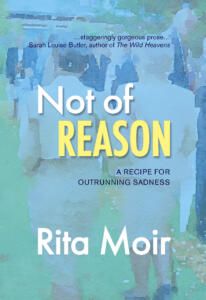 Author Rita Moir’s Memoir Not of Reason connected with me on many levels. It is an impeccable combination of sorrow and humour when life is at its lowest.
Author Rita Moir’s Memoir Not of Reason connected with me on many levels. It is an impeccable combination of sorrow and humour when life is at its lowest.
The author relates a true story of family loss and tackles that unanswerable question of what should be the right order of family deaths. Children should not die before their parents, but the author’s family has had to learn how to accept that fact plus an enormous amount of loss throughout the years, much of which was not always in the right order. They have been forced to accept loss at its most painful and move on with their own lives as best they could.
Having finished the book in two readings, I returned to it once more to absorb Moir’s compelling prose and deep sorrow as she specifically writes about coping with her sister and her mother’s deaths over a number of years, during which time she becomes both caregiver and griever to them both. And, despite the depressing topic in this work, this Memoir manages to spread hope as Moir shares her own “recipe for outrunning sadness.”
The part of this book I found the most rewarding was the strength and bonding of family and, even though all the family members live in various parts of Canada and America, they all supported one another and came together in time of need.
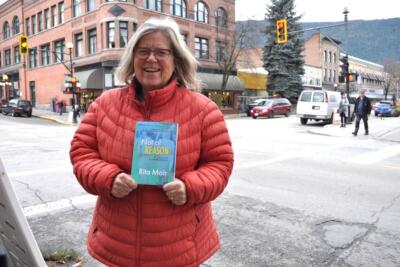
Author Rita Moir lives with her partner, Dan, in the Slocan Valley of British Columbia. Her much older sister, Judy and her mother (and deceased father) lived in St. Paul, Minnesota. Rita’s two brothers, Brian and Andy, live in Winnipeg and Nova Scotia respectively. One other sister, Donna, was born in the US with Canadian Citizenship like Rita. Donna later took out US citizenship and stayed in America but Rita retained her Canadian citizenship and has lived in British Columbia most of her life. This all meant that the large family of brothers, sisters, nieces and nephews are widely spread across the North American continent.
“I think of our family as holding down the pegs of a giant circus tent that stretches from BC to Winnipeg and Nova Scotia and down to Minnesota,” writes Moir. She adds:
Judy is the centre pole of our family tent. Mum and Dad steadied it as Judy grew stronger through all our family crises. Then Dad died and now Mum’s ascendance is waning. The main support of a circus tent is called the King Pole, but in our family we have a Queen Pole: Judy.
But then, while caregiving their mother, Judy’s own heart disease becomes steadily worse and Rita decides it is time for her to leave British Columbia and head to Minnesota to help Judy and their other sister Donna with the caregiving.
Throughout their mother’s risky heart surgery and the ups and downs of care-giving her afterwards, the family rally together with the two brothers and their own families also stepping up whenever needed. The fact that their mother miraculously pulls through the surgery is a testament to family love and support.
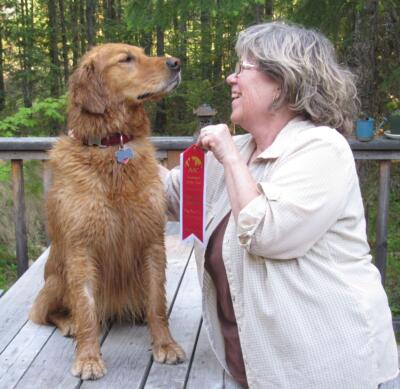
But then Judy’s illness grows even worse and the author describes her emotions through trying to accept that her older sister, the Queen Pole as well as her mentor and guide, might not be with them much longer. It is a painful realization to accept the fact that now a daughter might die before her mother.
Earlier Judy, who had already faced the deaths of her husband, stepson, and son, knows from experience that family deaths do not always happen in “the right order.” But Judy has always been the strong one in the family who has helped others through their losses.
This beautiful memoir explains the difficulties involved in accepting the dying process and then the grieving afterwards. I was particularly moved by Moir’s words about funerals that people like to refer to as “celebrations of life.” “When I die I conclude I want a funeral, a good old-fashioned funeral, ” states Moir:
I want mourning. I mean real mourning with gnashing of teeth and rending of garments, I am sick of the prettification of death, as if its power should be tamed with saccharine. Please do not displease me with a “celebration of life.” I will rise up and smite you.
Moir understands only too well that dying is not pretty and that grieving, for those who are left behind, is often unbearable, so she does not want people to celebrate her life when she dies. She knows that death is something we must all accept.
It should be dealt with for what it is — extreme pain. She does not want her own death sugar-coated. Somehow, if you read between her lines, she manages to get this point across to her readers with a touch of humour thrown in.
“Did Mozart call his Requiem a Celebration of Life?” she asks her readers. “He would have been tossed from the Church and laughed out of Vienna. Save the celebration of life for those too timid of death. Give me its ugliness, its pain and grace. Then bring on the Mozart.”
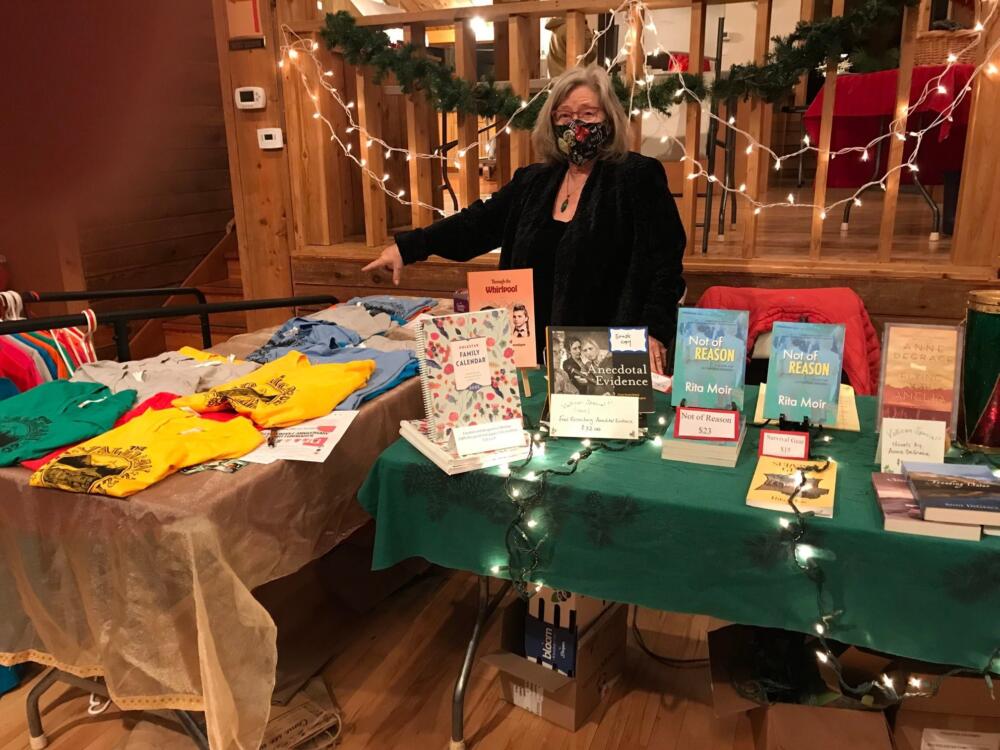
By the time Rita Moir’s mother dies at age ninety-nine, she has begun to come to terms with her older sister’s death and has learnt how to cope, and she and her family are able to give their mother a “grand Irish send-off” with “Danny Boy” and “When Irish Eyes are Smiling” being played as she takes her leave, “in grand style and in her leave taking, restores the natural order.”
Rita Moir’s Memoir is indeed a “Recipe for Outrunning Sadness” and will be greatly appreciated by anyone who is trying to deal with similar experiences.
Rita Moir has worked for many decades as a freelance journalist for the Globe and Mail, CBC Radio, and more regional publications. In addition she has been shortlisted and has won many awards for her non-fiction work. She has lived in many places across Canada and the United States and now resides in the BC’s West Kootenay region with her partner. Dan, their cat Lida and their dog Brier.
*
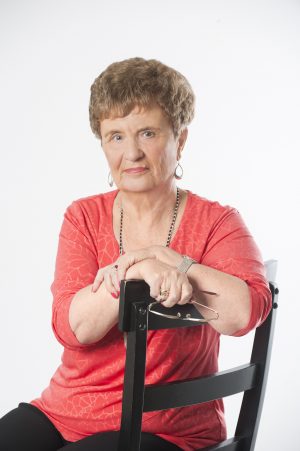
Valerie Green was born and educated in England where she studied journalism and law. Her passion was always writing from the moment she first held a pen in her hand. After working at the world-famous Foyles Books on Charing Cross Road, London, followed by a brief stint with M15 and legal firms, she moved to Canada in 1968 where she married and raised a family, while embarking on a long career as a freelance writer, columnist, and author of over twenty non-fiction historical and true-crime books. Her debut novel Providence has recently been published by Hancock House as the first of The McBride Chronicles, an historical four-generational family saga bringing early BC history alive. Now semi-retired (although writers never really retire!) she enjoys taking short road trips around BC with her husband, watching their two beloved grandsons grow up and, of course, writing. Editor’s note: Valerie Green has recently reviewed books by Pamela McGarry, George Mercer, Adrian Raeside, Haley Healey, Grant Hayter-Menzies, Michael Whatling, and Jen Sookfong Lee.
*
The Ormsby Review. More Books. More Reviews. More Often.
Publisher and Editor: Richard Mackie
The Ormsby Review is a journal service for in-depth coverage of BC books and authors in all fields and genres. The Advisory Board consists of Jean Barman, Wade Davis, Robin Fisher, Cole Harris, Hugh Johnston, Kathy Mezei, Patricia Roy, Maria Tippett, and Graeme Wynn. Scholarly Patron: SFU Graduate Liberal Studies. Honorary Patron: Yosef Wosk. Provincial Government Patron since September 2018: Creative BC
“Only connect.” – E.M. Forster
One comment on “1358 Dying in the natural order”